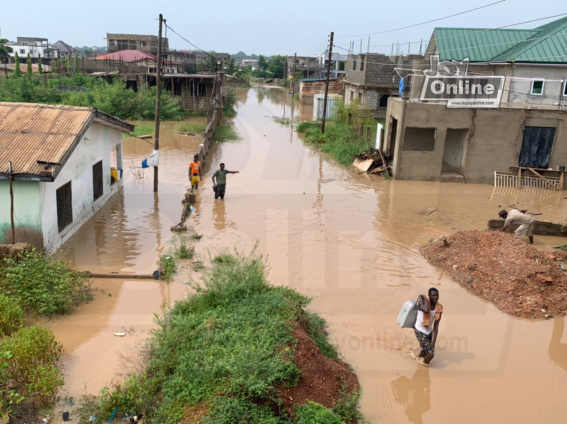Over 90% of people living in flood-prone areas are primary/ JHS/SHS leavers who lack information about flood.
That is part of the findings of a research by the Centre of Settlement Studies, the Kwame Nkrumah University of Science and Technology and the Network of Excellence in Land Governance in Africa (NELGA).
The research dubbed, NELGA Flood Land Research with funding from the GIZ sought to determine the category of people who acquire land in flood-prone areas in Kumasi.
It also aimed at establishing reasons for people acquiring and living on flood-risk lands
The researchers found that many of the victims have trade skills as hairdressers, welders, gadget preparers and carpenters servicing the urban economy with specialised artisanal trades.
Others are; head porters, table top traders, and street sellers trying to make a living for themselves.
The research also revealed that females with formal education below JHS level on flood lands are relatively higher (73.8%) than their male counterparts.
Also, it came out that the average number of children for the married cohort was three to four children. Thus, vulnerable families are mostly affected with over 80% of their jobs also being affected, when flooding occurs.
Most victims (92%) alluded to the fact that they have experienced flood waters to waist level, suggesting very severe flood occurrences that can be very devastating and traumatic.
Overall, the study has revealed that, while the vulnerable and socially excluded are making great strides towards making a living for themselves, the annual flooding is derailing their efforts and making them worse off.
Moreover, the national discourse often focusses on blaming them rather than seeing them as victims who need to be supported in terms of their recovery.
Many of these vulnerable groups struggle to build small scale businesses from scratch only for the floods to wipe out all their investments, every now and then.
Most of the Victims tend to rely on family members and neighbours for support.
The researchers recommended that the response strategy should focus on providing a resettlement scheme in rebuilding the lives of these families and also offering emotional support for especially the women and children for the trauma they may be faced annually anytime heavy floods occur.
Prof. Divine Ahadzie, Head of Settlement Studies said, “the Centre for Settlements intends to leverage on these findings in creating flood awareness in these communities on how to use community action in empowering themselves towards reducing their risk to flood hazards,” he said.
Latest Stories
-
Ghana and Seychelles strengthen bilateral ties with focus on key sectors
12 mins -
National Elections Security Taskforce meets political party heads ahead of December elections
15 mins -
Samsung’s AI-powered innovations honored by Consumer Technology Association
35 mins -
Fugitive Zambian MP arrested in Zimbabwe – minister
53 mins -
Town council in Canada at standstill over refusal to take King’s oath
1 hour -
Trump picks Pam Bondi as attorney general after Matt Gaetz withdraws
1 hour -
Providing quality seeds to farmers is first step towards achieving food security in Ghana
1 hour -
Thousands of PayPal customers report brief outage
2 hours -
Gary Gensler to leave role as SEC chairman
2 hours -
Contraceptive pills recalled in South Africa after mix-up
2 hours -
Patient sues Algerian author over claims he used her in novel
2 hours -
Kenya’s president cancels major deals with Adani Group
2 hours -
COP29: Africa urged to invest in youth to lead fight against climate change
3 hours -
How Kenya’s evangelical president has fallen out with churches
3 hours -
‘Restoring forests or ravaging Ghana’s green heritage?’ – Coalition questions Akufo-Addo’s COP 29 claims
3 hours

